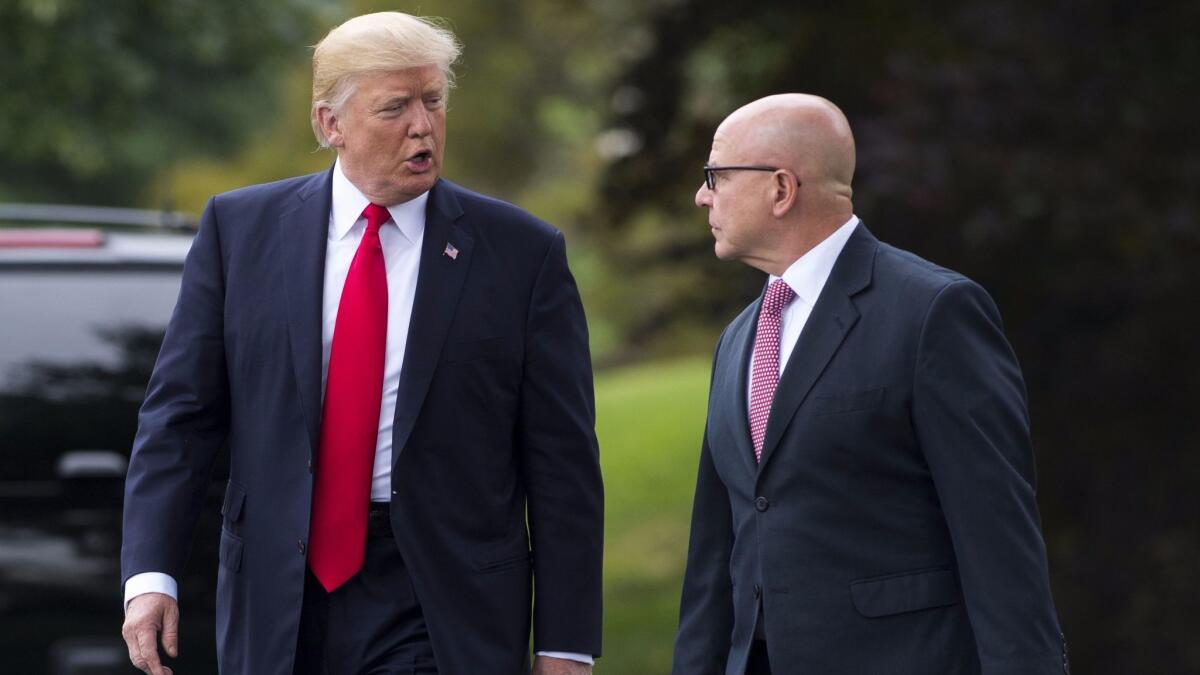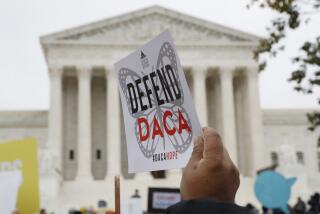A day of rumors over deportation policy highlights divisions within the Trump administration

A flurry of rumors, conflicting reports and divergent statements on Friday highlighted deep divisions within the Trump administration over a major element of immigration policy — the fate of the roughly 750,000 so-called Dreamers who are shielded from deportation by an Obama-era policy.
The rumors began after Homeland Security Secretary John F. Kelly, moving to meet a court deadline, issued a memorandum late Thursday evening that formally ended the legal fight over former President Obama’s 2014 DAPA program, known as Deferred Action for Parents of Americans and Lawful Permanent Residents. That initiative sought to temporarily remove the threat of deportation for more than 4 million immigrant parents of children who are U.S. citizens or lawful permanent residents.
The DAPA program was never fully implemented because of a series of legal challenges by mostly Republican-led states. So formally revoking it had little direct impact.
But one line of the memorandum noted that Obama’s 2012 order that shielded Dreamers — young people who came to the U.S. illegally as children — “will remain in effect.” That program, known as Deferred Action for Childhood Arrivals, began five years ago this week.
The language saying that DACA remained in effect raised hopes among immigrant activists that President Trump had decided to permanently maintain the program. Immigrant advocacy groups issued statements hailing a victory, only to see those forecasts reversed later in the day when administration officials said the Homeland Security statement was not intended to change the program’s tenuous status quo.
Trump vowed as a candidate to end DACA, calling it an “unconstitutional executive amnesty.” But since he took office in January, his administration has continued to receive applications and renewal requests, and grant work visas to eligible individuals. Immigration advocates have mounted a sustained effort to put political pressure on the White House and Republicans in Congress to protect the program.
The president has openly discussed wrestling with the issue.
“To me, it’s one of the most difficult subjects I have because you have these incredible kids,” he said at a news conference in February, referring to the Dreamers.
But within the administration, some officials continue to press for Trump to stick with his promise. They presented him with a draft executive order that would rescind the original 2012 directive.
Officials who favor repealing the program have found alternative ways to end it. One path explored by the White House would rely on an approach similar to the one that ultimately blocked Obama’s broader proposal to shield parents. The idea would have governors file a legal challenge to the program, at which point U.S. Atty. Gen. Jeff Sessions could instruct Justice Department lawyers not to defend it in court, leading to a potentially indefinite suspension.
So far, however, Trump has not agreed to any course of action. The Homeland Security Department has no other formal process underway to terminate the 5-year-old program, an administration official said.
At the same time, administration officials are anxious not to appear to have given up on the campaign vow to overturn DACA, knowing that the promise is popular with many who favor restrictive immigration laws, a group that is politically important for Trump.
A White House official insisted Friday that “there has been no final determination on DACA,” leaving it, and the fate of the estimated 750,000 Dreamers who have won work permits under the program, uncertain.
Rep. Michelle Lujan Grisham (D-N.M.), chairwoman of the Congressional Hispanic Caucus, said the ambiguity surrounding the administration’s policies “continues to create fear and anxiety in immigration communities.”
“Their announcement to keep DACA, while revoking DAPA and deporting family members, is deceitful and is another effort to keep immigrant families feeling uncomfortable about their place in America,” she said in a statement Friday.
On the other side of the debate, Trump’s failure to repeal DACA continues to generate complaints from advocates for reduced immigration.
“I certainly am very happy that Secretary Kelly ended DAPA ... that is a good thing and needed to happen — but it does not fulfill Trump’s campaign promise. DACA needs to be ended,” said Rosemary Jenks, the head of government relations for NumbersUSA, a group that advocates lower immigration levels.
There are ways to end DACA “to make it less painful” by phasing the work permits out gradually, Jenks said in an interview. NumbersUSA often mobilizes supporters to pressure lawmakers and the White House to adopt more restrictive immigration policies.
“It is clear the decision on DACA has been made at the White House,” Jenks said. “That is truly on Trump, and he needs to do it,” she said.
“You can’t continue to do something that is unconstitutional,” Jenks said, noting Trump’s repeated campaign statements labeling DACA as unconstitutional.
The administration has consistently said the priority of immigration authorities has been to identify and deport individuals who are in the country illegally and have a criminal record, or pose a threat to the American people. Testifying on Capitol Hill this week, Thomas Homan, acting director of Immigration and Customs Enforcement, said DACA recipients have maintained their protected status.
Some DACA recipients have been arrested, but they are people who “committed a crime and did something to violate the status,” he said.
“We are not as part of our operations targeting anybody in DACA status that’s fulfilling their obligation within the deferred action requirements,” he said.
Immigration advocates are pursuing multiple tracks to protect the program and its beneficiaries, working to identify and defend individuals protected by the order who have been subject to deportation orders and keeping pressure on the administration and Republicans.
“There’s been a lot of work to change minds and hearts. So I don’t think it’s easy for Donald Trump to just end this program,” said Lorella Praeli, director of immigration policy and campaigns for the American Civil Liberties Union. “[That] is why we must remain vigilant even though it’s still standing. We may see them try to chip away at the program internally.”
Praeli said that despite Homan’s comments this week, many requests from DACA recipients to renew their deferrals have been rejected without cause.
Angelica Salas, executive director for the Coalition for Humane Immigrant Rights, which helps guide potential DACA-eligible individuals through the application process, said the continued uncertainty is forcing families to make difficult choices, especially about whether to file applications that reveal information about a person’s immigration history.
“They understand [DACA] has always been temporary, but there’s a different level of sense of protection today,” she said. “Parents are fearful that that information can come back against the families. And there are other families that choose to apply understanding the risk.”
For more White House coverage, follow @mikememoli on Twitter.
Twitter: @ByBrianBennett
ALSO
The White House has found ways to end protection for ‘Dreamers’ while shielding Trump from blowback
Trump keeps touting jobs spurred by Saudi deals. It’s not clear they’ll ever come
Trump cuts back on historic opening to Cuba
Get live updates on our Essential Washington news feed
More to Read
Get the L.A. Times Politics newsletter
Deeply reported insights into legislation, politics and policy from Sacramento, Washington and beyond. In your inbox three times per week.
You may occasionally receive promotional content from the Los Angeles Times.








